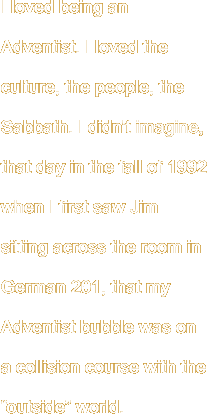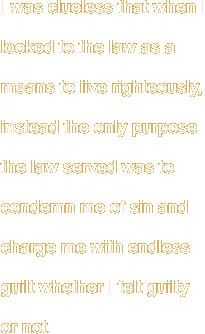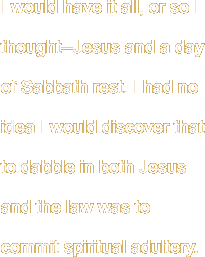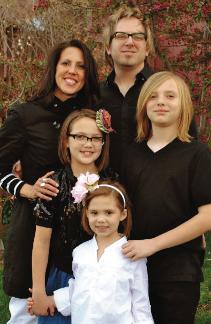HOME / PROCLAMATION! MAGAZINE / 2012 / SPRING / FAITH STORY
S P R I N G • 2 0 1 2
VOLUME 13, ISSUE 1
D E P A R T M E N T S


CHERIE SKRIVAN
I had just moved back to Lincoln, Nebraska, to start a new job and to finish my degree at the University of Nebraska. I wasn't looking for a relationship—that is, until I saw Jim. He was intriguing—confident, smart, and creative—just my type!
He was also raised Catholic.
Our relationship quickly grew, but I would be lying if I said I didn't have a nagging fear of our differences—particularly those pertaining to Sabbath/Sunday worship. But I prayed a lot—especially that, if Jim was the man for me, God would mold Him into the spiritual leader of our future home. I deeply desired spiritual congruity.
Jim quickly won over my family and me. Despite everything I had been programmed to believe about Catholicism, I found Jim quite open to my beliefs, and he was drawn to my devotion and discipline.
Nearly three years after meeting, we were married in the Seventh-day Adventist Church. While some people openly labeled us "unequally yoked”, my pastor, friends, and family graciously accepted Jim. Our future was bright.
Glimpses outside the bubble
I was working for a Seventh-day Adventist subsidiary in communications and marketing, and Jim was working full-time while finishing grad school. Upon his graduation we moved to Omaha, Nebraska. I continued to do work for the church, frequently traveling to Silver Spring, Maryland, working on various print, video, and satellite uplink projects for the North American Division (NAD) and General Conference (GC).
During that time I became aware that I lived in two different worlds. One world was the bubble of Adventism. It was warm, comfortable, and familiar, and when I stayed “inside”, I felt protected from the world's ideas. I knew how to be Adventist, and I loved everything about my Adventist life.
At the same time there was the world outside my bubble. Interestingly, there seemed to be pockets of Christians outside of Adventism who were more on fire for Jesus than most of the Adventists I knew. The contrast was undeniable, and I was confused. Their joy, peace, and passion for Jesus burned far brighter than my own. How could they live such righteous and godly lives apart from the 10 Commandments?
I had always considered myself a progressive Adventist. I thought my beliefs aligned wholly with Scripture but without the legalism many Adventists practiced. For example, I grew up in a meat-eating home but was a vegetarian because I didn't like meat's taste and texture, not because of an old covenant or Ellen G. White food law. I freely drank caffeine, but I didn't drink alcohol because I was irritated by friends who occasionally drank too much, not because Ellen G. White told me not to. And don't get me started on jewelry! I had no notion of hiding my bling while attending meetings at the NAD or GC. Sometimes I noticed the looks I got, but I really didn't care. I dismissed them as evidence of legalism.
I despised hypocrisy and desired to be authentically me. In fact, I exercised enormous religious freedoms. I justified my actions by using the “legalism” card, yet I didn't feel free. I began to feel a weight that I would eventually recognize as my chains of bondage to law, flesh, sin, and worst of all, idolatry.
Sabbath Guilt
Because I traveled quite a bit during the month, I began to cherish my weekends at home—particularly Friday nights--and I began to long for the Sabbaths I loved as a child. In our home Sabbath had been a respite. Friday nights had meant a clean house and yummy smells of Sabbath foods while the family gathered after a week of being scattered.
After taking a break from the Sabbath routine for many years, I longed to re-create my 24-hours of Sabbath bliss. Now, though, I was in a different home, and my husband and I had already set up a pattern of different traditions--secular movies on Friday nights, sometimes church on Sabbath morning, always lunch out that afternoon, and maybe some shopping. Moreover, if it was fall, football was always on our TV, particularly the Nebraska Cornhusker games. I couldn't blame my non-Adventist husband for these secular practices, either. These were things I started doing with Adventist friends while attending an Adventist College, years before I met Jim.
It wasn't until we had our first child that the guilt really hit. Now I was responsible for another life. Jim had given me full authority to practice and to raise our children in Adventism. He kept himself at arm's length from my church, however, because he had discerned the same issues of faith plus works and of doctrine vs. dogma in Adventism that he had found in his own Catholic upbringing. Privately, however, I longed for him to embrace Adventism, especially since we now had one child with another on the way.
While the Adventist Church was our family's “home”, our attendance was sporadic. We felt neither spiritual connection nor growth there. We were searching for a sense of belonging, but we didn't know that what we needed was Jesus.
My sister and the Sabbath
During these years, my sister started questioning the doctrines of the Seventh-day Adventist Church. I dismissed her with my pat answers, but the intensity of her questions burned during the fall of 2004 as she started studying her Bible more. “What do you think about our prophetess, Ellen G. White? Do you think she was really inspired by God if her prophecies failed or her teachings contradict His word?”
“I don't know,” I would reply. “I haven't read her books. She's not a source of inspiration for me. In fact I disagree with much of what she writes.” I felt liberal in thought and word as I spoke.
“Did you know that we're saved by faith alone, through grace alone, in Christ alone?”, she asked.
“What do you mean? Of course we're saved by grace!” I thought I spoke with authority and intelligence. After all, how many books on grace had I helped the Adventist church publish and put in the hands of Adventist pastors? Nevertheless, my cognitive dissonance was growing, and unbeknownst to me, Jim was seeing red flags.
One memorable day my sister and I were talking with her family about the Sabbath. I had already declared that I did not have any issues of salvation attached to Sabbath-keeping. I just couldn't imagine that God would keep my non-Adventist Christian friends out of heaven for not keeping the Sabbath. Moreover, I thought that because I blatantly “broke” Sabbath “laws”, seemingly guilt-free, that I had been freed from any kind of bondage.
The truth was I wasn't even aware that anyone could be in bondage to the law. I was clueless that when I looked to the law as a means to live righteously, instead the only purpose the law served was to condemn me of sin (Rom. 3:20) and charge me with endless guilt (Js. 2:10) whether I felt guilty or not.
“Do you know about our daily rest in Christ? Our sabbatismos rest that we have in the New Covenant?”
I braced myself for the onslaught of anti-Adventist--or at least anti-Sabbath--information I knew my sister would spew. Surprisingly, though, this time I deeply desired to know more. She was always able to back up her statements with Scripture--something I was keenly aware I could not do. I seemed always to confuse some sort of Ellen White-ism with Scripture and could never find what I was looking for when I tried to back up my responses with the Bible.
“No”, I responded. “What are you talking about? I think the fourth commandment is pretty clear; the Sabbath is an every seventh-day rest, remember?”
And then she showed me Hebrews 4, pointing out that our Sabbath rest is “Today”, meaning every day.
“Well, how do you know ‘Today' means every day?” I asked. Little did I know my sister owned a Greek dictionary. To my chagrin, she pulled it out. When I saw the definition of sabbatismos --a “Sabbath-like” rest, contrasted with the literal seventh-day Sabbath rest (sabbaton in the Greek) that is used in passages like Colossians 2:16 and Matthew 12:8, I was speechless. The two words for Sabbath were not the same words at all, and they had entirely different meanings.
Glorious reality
It wasn't rocket science. Colossians 2:17 was telling me that observance of a seventh-day Sabbath (sabbaton) was a shadow and that now, in the new covenant, the reality of a seventh-day Sabbath rest is Christ. Sabbath rest was no longer a day, but a Person, Christ.
I needed another perspective to confirm this discovery. My mind was racing. If the Bible teaches that Jesus fulfilled the law for me (Mat. 5:17-19; Rom. 8:3-4; Eph. 2:15-16; Col. 2:13-17; Heb. 10:5-10), then how does the law apply now--or does it? If Jesus set aside His glory to become my perfect Substitute, if He gave His life for me, becoming my Sin Bearer so that I could no longer be condemned for sin, then what were the implications when I kept going back to the very thing that condemned me (law) instead of to the Person who freed me from condemnation (Christ)? What was I saying about His sacrifice, about Him, when I clung to the law?
My fuzzy view of Sabbath was starting to come into focus. If Hebrews 4 tells me that in the new covenant our Sabbath rest (sabbatismos) is “Today”, every day, then there is no dispute about the Christian's relationship to the Sabbath. The rest Jesus offers (salvation) is a much more glorious reality than the 24-hour picture, or “shadow” of rest Israel was offered through the law or fourth commandment. The new covenant “Sabbath” is resting in Jesus!
This information was huge. I had never been taught this, had never been aware of these passages in their proper context. Certainly this information contradicted everything I had been taught my entire life about the Sabbath and salvation. If I wasn't saved by faith and works (obedience to God's Laws--specifically Sabbath-keeping), then what did it mean to be saved by faith alone? I knew I was at a crossroads in my belief system, and I had to choose either to move forward in this new scriptural discovery--or backwards to my old understanding of Sabbath.
That conversation served to intensify the doubt I was starting to feel about my Adventist beliefs, but for the next several months all I could find courage to do was pray. I felt inadequate to understand Scripture. If Adventist pastors couldn't get this right, how could I?
Paralyzed
By the spring of 2005 I was finding it harder to live in my Adventist bubble. I knew enough that I couldn't go back to my old understandings of the Sabbath's being a 24-hour period of rest or of the new covenant's being just a continuation of the old. What happened at the cross seemed way more pivotal than I had ever been taught. And by the way, who was this new Jesus I was discovering? He did more than make a down payment for my sin and salvation. He paid my entire debt. He covered all my sins at the cross--past, present and future. There was nothing left to investigate. If I believed in Him, I was saved. These truths were unbelievable--almost too good to be true. Yet there they were in black and white, printed in God's letter to me.
Nevertheless, I found myself paralyzed. Doubts and fears of leaving plagued me. What if Ellen G. White was right? What if I was one of “those people” leaving the Sabbath truth for Babylon? Furthermore, Jesus loved the Sabbath and kept it Himself. I loved my Sabbath. Even though I didn't “keep” it to the letter of the law, it was rich in warmth and comfort, and I gladly embraced it in ways that were meaningful to me.
My conflict reached a crisis one day in May when my husband and I were talking about it. “You can continue to go to the Adventist church, and you can take the children”, my husband said, “but I'm done. I can't go anymore. This was my last week there. I want to find a church where I can pursue a relationship with Christ and grow spiritually.”
“WHAT?” Alarm disoriented me, and I was having trouble focusing. I honestly didn't know how to respond. Nothing made sense to me. I had what seemed like a million thoughts and questions in my head. My husband had never taken such a strong stand about anything spiritual. All those years I had prayed for him to be the spiritual leader of our home, and now he steps up to the plate and this is what He has to offer? “What now, God?” I silently pleaded.
Relationship with Christ
“A relationship with Christ?” Jim's words echoed in my ears. What did he mean by that? I had thought Jim and I were growing spiritually closer the past few months, but now were we drifting apart?
Suddenly my mind went to the heart of the matter. “Well, I want a relationship with Christ too,” I blurted out. And I meant it. In those seconds of deep contemplation I suddenly saw that I had always had religion with Jesus in it, but I didn't have a relationship with Jesus. In those moments I realized those were two vastly different understandings, and only one counted for eternity. I had to know Jesus. If I didn't, on that important day He wouldn't know me (Matt. 7:21-23).
During that conversation, Jim and I began to develop a plan. My sister had shown me enough to plant a lot of questions in my mind, but now it was up to me to start digging into Scripture for the answers. I was highly motivated now. I wanted to know, really know this Jesus. If so much of what I had been taught was wrong, then maybe I didn't really know the Jesus of the Bible. What really did happen at the cross? Colossians 2 certainly painted a different picture than anything I had previously known.
I recognized that I could no longer live with my feet in different worlds, and I prayed for guidance. By the next day, after God reminded me that He was answering my more than 13 years of prayer for Jim to become the spiritual leader of our home, I told Jim that I would respect his decision to stop attending the Adventist church. In solidarity with his spiritual leadership, I, too, would stop attending while I searched the Scriptures for answers to my questions. If I wanted to study the Bible without the filters of Adventism, including the culture, I needed to separate totally from everything I knew. I told Jim I wanted to learn from God's Word alone, and I would follow Him wherever He would lead me. Of course, I fully expected that He would lead me back to the Adventist church, but I would return with the full understanding of God's grace and the reassurance of a restored relationship with Christ. I would have it all, or so I thought--Jesus and a day of Sabbath rest. I had no idea I would discover that to dabble in both Jesus and the law was to commit spiritual adultery (Rom. 7:1-6).
I voraciously dug into the Bible, starting with Galatians, and was immediately blown away. Galatians 2:21 became my anthem, “if righteousness comes through the Law, then Christ died needlessly.” Ugh. I had lived my entire life with a totally opposite understanding. I thought obedience to the law was my means to righteousness. Indeed, the law saved me, at least in large part. The truth was, the farther away I got away from Sabbath-keeping, the more evident it became how deeply and powerfully the ties of Sabbath and salvation were intertwined in me. This realization of the depth of my bondage came as an absolute shock.
Rescued!
Up until this point, I had had the best of both worlds. I had the “truth” and “rest” of Sabbath-keeping without the bondage or guilt of any laws tying me down. What I had concocted in my mind was beautiful, but it was not reality. It was my justification for doing whatever I wanted to do, but it wasn't what I really believed. Deep down in the depths of my soul, the Sabbath meant much more to me than a relaxing day of rest or a day spent with family and friends--a mini-taste of heaven. In truth, it was the core of my salvation, and the thought of leaving it behind evoked enormous fear and frustration. I feared I was being deceived, yet I was frustrated because I could see in Scripture that what I had believed about the Sabbath was a lie. Even so, it had a death-grip on me. While it contradicted everything I was learning in Scripture, I could not let go of the Sabbath day.
Then one hot day in July, 2005, God came on a rescue mission for me. It was a particularly difficult day. I had finished my study of Galatians and had moved to the book of Hebrews where I was learning about the sufficiency of Christ. Again I was reminded that the law was a shadow of Christ (Heb. 8:4-5; 10:1) and that the “tables of the Covenant” were obsolete, growing old and ready to disappear (Heb. 8-9), that when the second (the new covenant, Christ) was established, the first covenant (law) was taken away (Heb. 10:9).
I was doing laundry that day in total turmoil--silently sobbing while truths and lies were colliding in my head. I felt confused, yet reality was setting in. The gravity of the theological lies woven into Adventism was devastating. I was buried in grief for myself, for my church, and for the people that I loved so much.
I was walking through my hallway carrying a basket of clothes and crying out, “God, I don't know how to walk away from Sabbath-keeping! This day, this church, these people mean everything to me. I can see that I'm clinging to a shadow, but this shadow feels more real to me than You. I really thought you would lead me back to the Sabbath ‘truth'; but it seems that you are leading me farther from it. If that is what you really want me to do, to walk away from keeping the seventh-day Sabbath, to walk away from the Adventist church, then you're going to have to make that really obvious and clear to me. I promised you when I started studying your word that I would trust you and follow you wherever you led me on this journey, but I can't leave this church I love by my own doing. You have to do it for me if that's what you want me to do.”
At that moment it was as if He reached down and put His hand on my right shoulder, steadying me while simultaneously giving me enormous comfort and peace. And then these words flooded my head, “Cherie, I am going to put this in terms that you will understand. You are breaking the first commandment to keep the fourth.”
“Ohhhh,” I gasped. I had complete clarity, and I was deeply convicted. I sank to the floor, setting my basket aside, and burst into tears. “Lord,” I cried out, “I totally get it now. The Sabbath was my idol, my god, my savior. It was my source of salvation instead of You alone!”
In that moment on my hallway floor I experienced my new birth in Christ (Jn. 3). I also experienced a freedom I had never felt before. In that moment my two worlds collided, and my Adventist bubble burst--but now I could see I had never lived in two separate worlds. There had only been one world--the world of law, flesh, and sin. I had lived my entire life up to that point under condemnation of the law which only served to energize more sin (Rom. 5:20; 7:14-25). Although the law was given to point us to Christ, by my conscious choice to live under the law--a fading glory of righteousness, a ministry of death--I wasn't able to “see” the greater glory of Christ (2 Cor. 3). Looking back from that moment I could see how empty and unfulfilled I had been apart from a life-giving relationship with God. I slowly drew in my first breath of new life in Christ, thanking God for His faithfulness and rejoicing in the moment. I was stunned by God's miraculous delivery.
Amazingly, in a few seconds, everything changed. An enormous weight was lifted as God broke my heavy chains of bondage to law and sin, shattering all the lies I had grown to believe about the relevance and purpose of the law. I had put the law first, the Sabbath first, the Adventist church and culture and all my family and friends first. I cared more about what they thought than what God thought. They were all more important to me than Jesus alone. The shadows had meant more to me than reality--Christ. Everything was changed, and I would never be the same again. I had no choice but to follow Him, and I couldn't wait!
On that day, I died to self and rose to my new life in Christ! In that moment, God transferred me from the kingdom of darkness, a world of sin and condemnation, into the Kingdom of His beloved Son (Col. 1:13). He exchanged the external law with His Spirit, the Law-keeper, Who now lives inside me, transforming me from the inside out and guaranteeing my salvation (Rom. 8:9-16; Eph. 1:13-14). In this act, He credited me with His righteousness, never again to be confused with my own self-righteous attempts of law-keeping and obedience.
He gave me a new birth certificate and it reads, “Cherie Skrivan, Child of God, Heir to the King. Welcome to My Eternal Kingdom”.
My Adventist bubble is gone, and I have a new identity. I now live in the reality of being hidden with Christ in God (Col. 3:3).†

Copyright 2012 Life Assurance Ministries, Inc., Casa Grande, Arizona, USA. All rights reserved. Revised April 18, 2012. Contact email: proclamation@gmail.com




Cherie Skrivan was born and raised in the Seventh-day Adventist church and school system. She, Jim, and their three children live in Omaha, Nebraska, where they are members of Christ Community Church. Cherie is passionate about encouraging people to grow their faith in Christ and enjoys helping teach a discipleship class at their church.